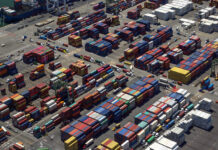
The International Tank Container Organisation (ITCO) has published its 12th Annual Tank Container Fleet Survey.
This year’s Survey estimates that, on 1 January 2024, the global tank container fleet had reached 848,400 units worldwide, compared to 801,800 on 1 January 2023, a year-on-year growth of 5.81%.
Reflecting continued strong demand for new equipment, approximately 56,600 new tank containers were built, compared to 67,865 new units in the previous year – and 53,285 in 2022. However, with an increase in the number of tanks being scrapped, or sold out of the industry, the overall growth in the global fleet is 46,600 units.
The Survey shows how, numerically, the industry continues to be dominated (on a global level) by a relatively small number of major tank container operators and leasing companies. The top 10 tank container operators account for over 297,000 tanks, representing over 50% of the global tank container operators’ fleet. The top 10 leasing companies account for 317,740 tanks, representing about 85% of the total leasing fleet.
Commenting on the results of the Survey, Paul Gooch ITCO President, notes: “The global tank container fleet continues to grow, although at a slightly slower rate in 2023 compared with previous years. This was to be expected, considering the variety of economic and geo-political headwinds being experienced by the chemical industry, and the weakness in global GDP growth. We also had to reckon with a correction after the record year in 2022, which had been fed by the supply chain disruption resulting from the Covid-19 pandemic.”
He continues: “Our 2023 Report noted the ramping up of production to meet short-term demand was likely to result in an over-supply of tanks, and an adjustment in production rates in 2023. The latest report appears to, at least in part, bear out that prediction, although the adjustment may not have been as severe as expected. However, as was already evident in early 2023, chemical companies were returning tanks as supply chain bottlenecks eased and the need to hold ‘just-in-case’ inventories declined. Operators were also adjusting their fleet levels and taking tanks off-lease.”
Looking ahead to ITCO’s activities in the coming year, Paul Gooch confirms that ITCO’s aim continues to be to ensure that its initiatives, projects, and events are designed to serve the needs of the members, and deliver tangible value.
“ITCO will continue to drive initiatives supporting safe working practices, environmental best practice, and efficiency improvements through global standards and digitalization”, he says. “But we will be more diverse and inclusive in our approach. We will also focus on expanding our geographical footprint – recognizing the need to be more present and active in the Americas, India, and Asia Pacific. The location of our events and agenda content will also reflect this geographical diversity, and the need to leverage technology advances.”
This article was written by the International Tank Container Organisation (ITCO)








